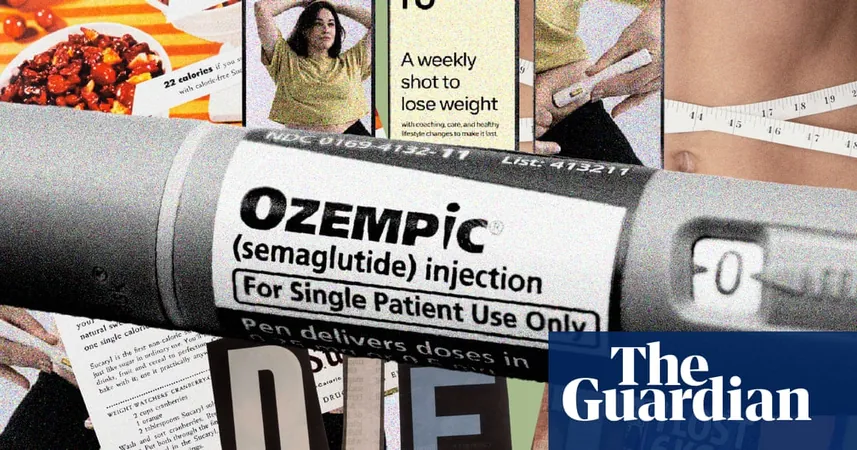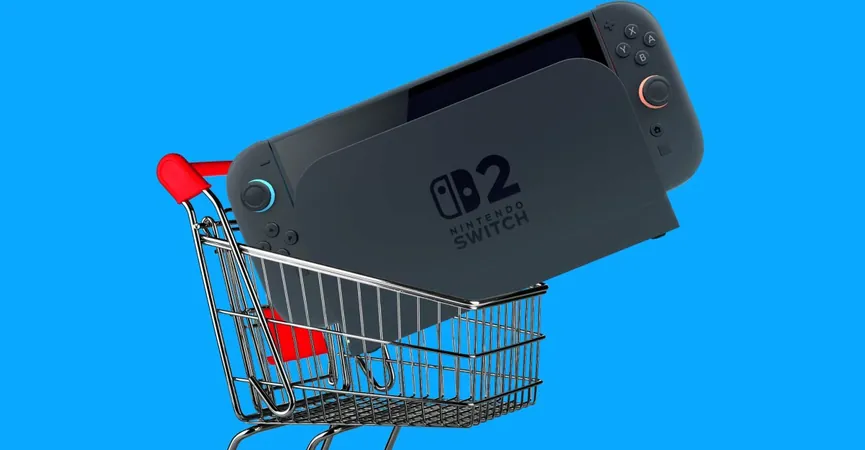
The Ozempic Craze: Miracle Drug or Hidden Hazard for Eating Disorders?
2025-04-04
Author: Kai
Introduction
In just three years, GLP-1 drugs like Ozempic have transformed society's obsession with body image, intensifying a cultural desire for thinness. Originally marketed as a solution for those struggling with obesity-related health issues, these drugs have seen one in eight Americans experimenting with them, amidst a growing market of off-brand alternatives available with minimal medical oversight.
How Ozempic Works
Ozempic, which contains semaglutide, mimics a natural hormone to stimulate insulin production and slow stomach emptying, enhancing feelings of fullness. However, experts warn about the risks for individuals with eating disorders. Some healthcare professionals suggest that using a drug that drastically reduces caloric intake could be construed as a medical breakthrough for weight loss or, troublingly, as a potential catalyst for dangerous eating habits. According to Dr. Kimberly Dennis, a psychiatrist specializing in eating disorders, "These drugs are rocket fuel for people with eating disorders."
Concerns Over Eating Disorders
Healthcare experts like Pamela Keel from Florida State University emphasize that appetite suppressants can exacerbate restrictive eating behaviors. It is alarming that GLP-1s may not only enable patients to eat less but could also spur harmful practices like purging. The telehealth boom provides relatively easy access to these medications, underscoring a troubling reality: some may receive prescriptions without a thorough evaluation of their eating disorder history.
The Duality of GLP-1s
While concerns mount over the potential for GLP-1s to provoke or exacerbate restrictive eating disorders, there is also emerging research indicating that they may hold some benefit for those with binge eating disorder—an ailment statistically more prevalent than anorexia. This duality highlights the complex role these medications play in the realm of disordered eating, leaving many patients, like Lily, navigating a treacherous path of recovery.
Case Study: Lily's Experience
Diagnosed with adult-onset type 1 diabetes, Lily found herself prescribed Ozempic despite her long-standing history of anorexia. Though it initially helped stabilize her blood sugar levels, it inadvertently triggered a relapse, leading her into a precarious cycle of restriction and overeating. Fortunately, with continual support from her healthcare team, she has been able to regain some balance, although the fear of loss of control remains ever-present.
The Need for Monitoring
Experiences like Lily's further underscore the urgent need for comprehensive monitoring of patients using these drugs. There is significant concern that while Ozempic may help mitigate binge eating, it could reignite symptoms in those with previously diagnosed eating disorders. With the absence of long-term data, the medical community is left in a quandary, weighing immediate benefits against potential risks of relapse or exacerbation of existing disorders.
Another Perspective: Megan's Story
Megan, another user of GLP-1 medication, provides a different perspective. After years of struggling with an eating disorder that involved cycles of bingeing and purging, she found hope in the appetite-suppressing effects of GLP-1s, which allowed her to break free from her former obsessive patterns around food. “I always thought it was a willpower issue,” she said, “but now I know it was biological.”
Cultural Pressures and Ethics
The debate surrounding GLP-1 drugs risks being overshadowed by societal pressures associated with body image. Critics argue these medications may reinforce harmful narratives that suggest being thin is inherently better, risking further stigmatization of those struggling with their weight or eating disorders. Maria Rago, a psychologist, highlights this intersection, asserting that many believe the popularity of such drugs could worsen the cultural narrative around body acceptance.
The Role of Healthcare Providers
With momentum building for broader acceptance and use of GLP-1s, healthcare providers are increasingly tasked with ensuring safe and responsible prescribing. Screening for a history of eating disorders has become integral, though some argue that even a past diagnosis should not automatically disqualify someone from these treatments.
Conclusion
As experts continue to study GLP-1s, Lily's journey serves as a poignant reminder of the personal narratives entwined with these medications. Each individual's experience with their body, weight, and eating is unique, making this a complex landscape for both patients and providers. With cries for body positivity echoing through the cultural zeitgeist, the challenges presented by the Ozempic phenomenon remind us that navigating health—including mental health—requires nuanced understanding and a compassionate approach.
Resources
If you or someone you know is struggling with an eating disorder, resources are available. In the U.S., help can be sought at nationaleatingdisorders.org or by calling the ANAD hotline at 800-375-7767. For UK residents, Beat can be reached at 0808-801-0677, and in Australia, support is available through the Butterfly Foundation at 1800 33 4673.


 Brasil (PT)
Brasil (PT)
 Canada (EN)
Canada (EN)
 Chile (ES)
Chile (ES)
 Česko (CS)
Česko (CS)
 대한민국 (KO)
대한민국 (KO)
 España (ES)
España (ES)
 France (FR)
France (FR)
 Hong Kong (EN)
Hong Kong (EN)
 Italia (IT)
Italia (IT)
 日本 (JA)
日本 (JA)
 Magyarország (HU)
Magyarország (HU)
 Norge (NO)
Norge (NO)
 Polska (PL)
Polska (PL)
 Schweiz (DE)
Schweiz (DE)
 Singapore (EN)
Singapore (EN)
 Sverige (SV)
Sverige (SV)
 Suomi (FI)
Suomi (FI)
 Türkiye (TR)
Türkiye (TR)
 الإمارات العربية المتحدة (AR)
الإمارات العربية المتحدة (AR)